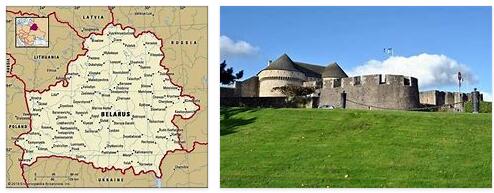Belarus, whose name appears historically in the century. XIII, was colonized between the sec. V and VIII from Slavic tribes, fell under the rule of the Principality of Kijev around the century. IX and at the end of the century. XIV, after undergoing the Mongol invasion and being passed to the Dukes of Lithuania, for the marriage of a Grand Duke of Lithuania with Hedwig Queen of Poland (1386), it became part of Poland. Its history remained linked to that of Poland until the first postwar period, when its territory was divided between Poland and the Soviet Union (Treaty of Riga, 1921). Invaded by the Germans during the Second World War, at the end of the conflict the Polish side also became part of the Soviet Republic of Belarus. For the next forty years, Belarus did not have a political life of its own – despite its vast formal autonomy, including a seat in the UN – and its politicians participated in the general affairs of the USSR. Directly involved in the dissolution process of the Soviet Union, Belarus proclaimed its sovereignty in 1991, but became part of the constitution of the Commonwealth of Independent States (CIS) remaining a member. According to globalsciencellc, one of the major problems that the new state had to face, in addition to the gigantic one of a radical economic reconversion, was the management of a considerable military atomic potential accumulated in the Soviet period. The problem was solved with an agreement implementing the START Treaty (Lisbon, May 1992) in which Belarus, Ukraine and Kazakhstan renounced the status of nuclear powers and transferred their arsenal to Russia. Meanwhile, the Belorussian political scenario outlined within it a strong opposition between an elite nationalist liberal and the proponents of a close economic and political link with Russia, considered by most of the population as an extension of their homeland. Launched the new Constitution in 1994, the subsequent presidential elections (summer 1994) determined the victory of A. Lukašènka, populist candidate of a sort of “clean hands” movement and former president of a parliamentary commission against corruption.
The latter, in favor of a privileged relationship with Russia, immediately initiated a process of integration with that country, which was embodied in the customs agreement (May 1995) and in the intention of canceling mutual debts. Regarding domestic politics, despite the hard opposition of the nationalist movement and the resistance of the communists, a referendum was held, in conjunction with the legislative elections of May 1995, to amend the Constitution and to extend Lukašènka’s mandate until 2001. Having obtained 80% of the consensus, the amendments to the fundamental charter therefore expanded the power of the President of the Republic and transformed the Parliament into a bicameral body. The integration policy with Russia continued, with the signing of the Union Treaty (May 1996), the protests of the nationalist opposition resumed, followed by the closure of some press organs and a strong repression by the government of hostile intellectuals to the Lukašènka regime. For this reason, in 1998 the OSCE established a permanent mission in Minsk to assess the extent of human and political rights violations in the country. On the economic level, meanwhile, the defense by the government of the old “socialist” structures of the country, necessary to guarantee the maintenance of a sufficient standard of living for the majority of the population (and therefore also a good electoral consensus), determined the persistence of a period of stagnation, which only thanks to the support of Russia did not degenerate into a catastrophic crisis and indeed, starting from 2001, saw the start of new growth. The opposition for its part, despite the attempts in 1999 to delegitimize the extension of Lukašènka’s mandate, the continuous protests and the open support of Western governments (especially the United States), she could not get any results as she was fragile, divided and not very credible in the eyes of the Belorussians. The objective difficulties of the regime, therefore, did not prevent the presidential elections of 2001 from reconfirming the mandate of Lukašènka with 80% of the votes. In 2004 there were both legislative elections, won by the president’s party, and a referendum that provided for the abolition of the limit of two presidential terms, with the aim of allowing Lukašènka a third re-election.
The outcome, taken for granted, was in favor of the president. In the meantime, despite the clearly favorable opinion of the public opinion of both countries, verified in many polls, the integration process with Russia was progressing very slowly and continuously on both sides. L’ the adoption of a single currency, expected from 2001, was postponed to 2006; and little progress has been made in negotiations to establish the mutual weight of the two parties (and their respective leaders) in the future unitary state, despite a draft statute being finalized in 2003. In the presidential elections of March 2006, Lukašènka obtained 82, 6% of the votes, even if the OSCE contested the elections and the opposition denounced fraud. In that same year, oil and gas had been the cause of strong tensions with Russia, while the protests of the regime’s opponents continued to be harshly repressed in domestic politics. In September 2008, elections for the renewal of parliament took place, in which fiolo-government candidates won in all constituencies. Later the Osce declared that the elections would not be held according to international democratic standards. In 2010 the customs union with Russia and Kazakhstan; in December, presidential elections were held in which Lukašènka obtained an overwhelming majority (80%), followed by a large protest demonstration by the opposition denouncing fraud. In the following days, the police arrested many opposition political representatives, including leader Andrei Sannikov. In September 2012, elections were held for the renewal of the lower house of parliament, in which no opposition deputy was elected. In October 2015, Lukašènka was elected for the fifth time, reaching almost 90% of the votes.
